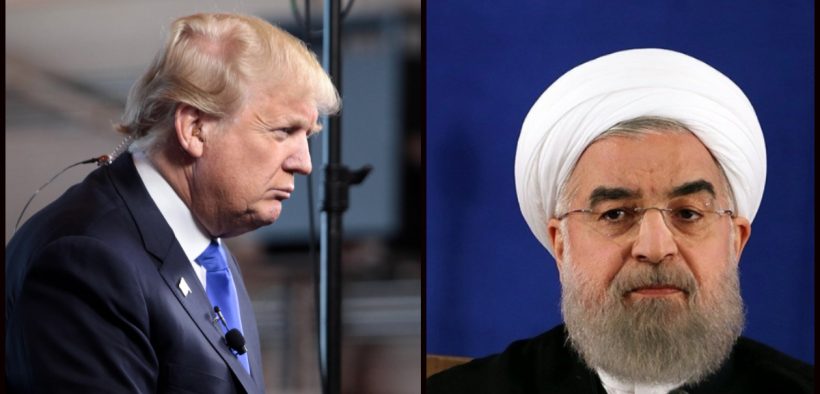US-Iran Escalation: Iran Increases Uranium Production as US Mulls Bombing Iran

“According to the officials, since Friday, the White House has been holding incessant discussions involving senior military commanders, Pentagon representatives and advisers to President Donald Trump.”
Tensions between the United States and Iran escalated on Monday, as Iran’s spokesman for the country’s atomic agency announced Iran will break the uranium stockpile limit agreed upon in the 2015 nuclear deal in the next 10 days and the U.S. is reportedly weighing a military strike on Iran.
“We will go further from that ceiling, not only that but we will also increase production drastically. After we pass the limit of 300 kg, the pace and the speed of enriched uranium production at the lower rate will also increase,” said Iran’s Atomic Energy Organization spokesman Behrouz Kamalvandi.
The spokesman said the only way Iran will honor its uranium agreement is if European nations override U.S. sanctions and give Iran access to the global financial system.
Oil Tankers Attacked
The development comes a week after an attack on oil tankers in the Gulf of Oman spiked tensions in the region. The Pentagon released photos on Monday that officials claim support their assessment that the Iranian Revolutionary Guard is responsible for the attacks, a claim Iran denies but is backed by the UK, Saudi Arabia, and Israel.
“Iran is responsible for the attack based on video evidence and the resources and proficiency needed to quickly remove the unexploded limpet mine,” said a statement by U.S. Central Command on Monday.
However, U.S. allies Japan and Germany expressed uncertainty regarding the attack and demand more evidence before taking conclusive action, while other critics dispute the official narrative and believe the attack could have been perpetrated by one of Iran’s numerous enemies as a means to justify war.
“The maximum restraint and wisdom should be applied,” said E.U. foreign policy chief Federica Mogherini.
Yutaka Katada, the owner of one of the attacked ships, said the vessel’s crew saw a “flying object” before being hit by a second blast, contradicting reports that the attacks were carried out by limpet mines attached to the ship.
“I do not think there was a time bomb or an object attached to the side of the ship,” Katada said on Friday.
“The question arises as to why Tehran would commit such an attack because it only harms Iran on the world stage and helps its enemies, while skepticism is also warranted due to the unreliability of [US] intelligence,” Max Abrahms, professor of political science at Northeastern University, told Al Jazeera, referencing the false information that led to the US’ 2003 invasion of Iraq.
Common Dreams’ Gwynne Dyer writes the attacks could be a ‘false flag’ set up by the UAE or Saudi Arabia, as “all six tankers that have been attacked sailed from ports in Saudi Arabia or the UAE,” and setting up the type of mines in question is almost impossible once a ship is underway.
Analysts who believe Iran is behind the attack argue its attacks and uranium announcement could be a desperate attempt to use its remaining leverage to assert power over the global energy trade. While Iran could not defeat the U.S. in war, the attacks could be a signal of Iran’s unwillingness to submit to the U.S., and its capacity to inflict severe damage in the event of all-out war.
The 2015 Joint Comprehensive Plan of Action (JCPOA), also called the Iran nuclear deal, restricted Iran’s nuclear program in exchange for eased sanctions and the country’s reintegration into the global economy. President Trump withdrew from the deal last year and reimposed harsh economic sanctions that have devastated Iran’s economy.
Until recently Iran has complied with the agreement’s uranium commitments, but the country blames the Trump administration’s failure to honor the international nuclear deal as its reason for violating its side of the bargain.
US Considering an Iran Strike
While some argue full-scale conflict with Iran is unlikely because it would have devastating consequences on U.S. allies and wreak havoc on the region, the Jerusalem Post reported Monday that U.S. officials are considering a tactical strike on an Iranian nuclear facility.
“According to the officials, since Friday, the White House has been holding incessant discussions involving senior military commanders, Pentagon representatives and advisers to President Donald Trump. The military action under consideration would be an aerial bombardment of an Iranian facility linked to its nuclear program, the officials further claimed.
“The bombing will be massive but will be limited to a specific target,” said a Western diplomat, according to the Jerusalem Post. The Post’s report also noted that sources said President Trump did not want to escalate the conflict militarily, but is conceding to Secretary of State Mike Pompeo, who claims unequivocally that the Gulf tanker attacks were executed by Iran.
The Iranian ambassador to the United Kingdom Hamid Baeidinejad told CNN on Monday Iran will not back down if the U.S. takes military action. “Unfortunately we are headed towards confrontation,” said Baeidinejad.
The Pentagon announced on Monday it would send 1000 additional soldiers to the region.
“In response to a request from the U.S. Central Command for additional forces, and with the advice of the Chairman of the Joint Chiefs of Staff and in consultation with the White House, I have authorized approximately 1,000 additional troops for defensive purposes to address air, naval, and ground-based threats in the Middle East,” acting Defense Secretary Patrick Shanahan said in a statement.















